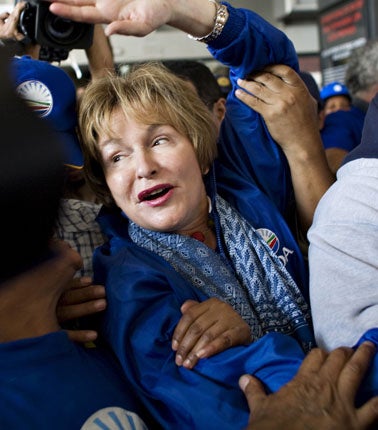Size of ANC's win could see opposition unite
Zuma's resounding win in the South African election could prompt the losing parties to join forces. Daniel Howden reports on what the new political landscape might look like.

In the aftermath of another resounding victory for the African National Congress (ANC) yesterday, the first outlines of what some experts believe will be a complete realignment of politics in South Africa were becoming visible.
As the final results trickled in and the extent of Jacob Zuma's victory became clear, his ruling party looked set for the two-thirds majority it had publicly targeted. However, it was the rash of smaller parties who were the clear losers, suggesting for the first time that opposition to Africa's grandest liberation movement is set to consolidate. Smaller groups or regional powers such as the Independent Democrats (ID) and the Zulu Inkatha Freedom Party (IFP), which had previously commanded influential support in some areas of the vast country, fared badly.
Despite the emergence of the Congress of the People (Cope), a breakaway party made up of ANC dissidents, the largest opposition bloc remains the white-led Democratic Alliance (DA). It nearly doubled its vote and won South Africa's richest province, the Western Cape, but its leader, Helen Zille, was among the first to predict a shake-up. "We have got to realign politics in South Africa and that's what I'm going to spend the next five years doing," she said.
With most of the votes counted, the DA was on course for 16 per cent of the total, with the Cope on less than 8 per cent. None of the 23 other national parties was expected to break the 2 per cent threshold.
The DA, trading heavily on Ms Zille's performance as mayor of Cape Town, has been successful in reaching out to white liberals and mixed-race voters, but has failed to make in-roads into the black vote. Observers are expecting an initial alliance and then, in the medium term, a possible merger between some elements of Cope and the DA. Both parties are roughly centrist groupings, to the right of the ANC. But recent political history means such designations are not altogether stable.
The Cope presidential candidate, Bishop Mvume Dandala, ruled out any return to the ANC fold but said his party would consider a coalition with other groups. "The DA faring a little better than expected and Cope doing a little worse has been good for the prospects of realignment," said Andrew Feinstein, a political commentator and former ANC MP. "The DA knows it has made no inroads into the African vote and had Cope performed better it would have no need to look for realignment."
He predicted that by 2014 the ANC could be challenged by a "non-racial opposition".
The ID leader Patricia De Lille, who played a prominent role in exposing a shady arms deal that has dogged the ANC, conceded that her party needed new partners and called for "like-minded" opposition parties to unite.
The ANC's bedrock of support among unions and the working class survived the nation's most hotly-contested election unscathed despite the criticism Mr Zuma faced. Dr Adrian Hadland, of the Human Sciences Research Council, said: "Without the unions and working class you are not going to shake the ANC."
However, after years of broken promises and slow progress on a post-apartheid dividend to the poor, Mr Zuma will be under pressure. South Africa has become the developing world's largest welfare spender, but there is a belief that the cash is not used efficiently.
Mr Zuma portrayed himself as a fresh start after his unpopular predecessor Thabo Mbeki, but his populist approach has raised expectations to a level where they will have to be met quickly. "He is unlikely to have the honeymoon period enjoyed by past ANC governments," said one analyst. "If he fails to deliver, the poor will also turn against him."
Join our commenting forum
Join thought-provoking conversations, follow other Independent readers and see their replies
Comments
Bookmark popover
Removed from bookmarks